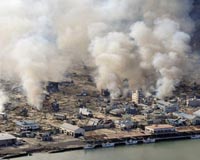| . |  |
. |
Dharamshala, India (AFP) March 17, 2011 The Dalai Lama rejected on Thursday calls from his followers and the Tibetan parliament-in-exile urging him to reconsider his decision to retire as political head of the movement. The 75-year-old spiritual leader announced last week that he wanted to shed his role as political chief of the government-in-exile and hand his responsibilities to a new prime minister who will be elected on Sunday. The Nobel laureate, who will retain the more significant role of Tibet's spiritual leader, stressed he was still "fully committed" to the struggle against authoritarian Chinese rule in Tibet. The overwhelming majority of members of the 43-seat Tibetan exile assembly have argued against his decision to give up the political role, with many saying that their cause would be undermined. "No (I will not reconsider). I gave serious consideration for many years... my decision for the long run is best," he told AFP during an interview in his home in exile in the foothills of the Indian Himalayas. "Rule by spiritual leaders or by kings, these are now out of date," he said, adding that he wanted to set an example of a non-elected leader who was happy to relinquish power in the name of democracy. The comments come amid turmoil in the Middle East where royal families, particularly in Bahrain, are under pressure from pro-democracy demonstrators. "The world is changing," he said. In a letter read out to the parliament on Monday, the world's most famous monk argued that the Tibetan movement was now mature enough for an elected political leader with greater power and responsibilities. The Dalai Lama favours "meaningful autonomy" for his people from Chinese rule, but Beijing considers him a separatist bent on fomenting unrest in his homeland, which he fled in 1959. "Regarding the Tibetan justice struggle, I am fully committed. Every Tibetan has a responsibility," he told a small group of journalists at his residence in the hill town of Dharamshala. Last week's announcement by the Dalai Lama took many followers by surprise and there is unease about whether the future political elected leader will have the clout internationally to keep the Tibet struggle in the global public eye. No major world power recognises the government-in-exile. The current exiled prime minister, Samdhong Rinpoche, told AFP in a separate interview on Thursday that there had been "thousands" of petitions to the Dalai Lama from followers who are "disturbed" by his radical proposal. "There is no way to argue with him or disobey his instructions," he conceded. "Of course, no one can replace or substitute the Dalai Lama, but we have to build our own image and our own structure," Rinpoche added. On Sunday, an estimated 85,000 exiles scattered across 13 countries will go to the polls to elect a new prime minister, known as the Kalon Tripa, who will assume greater powers and prominence under the Dalai Lama's plans. The front-runner is Lobsang Sangay, a scholar with a doctorate in law from Harvard University who was born in India and has never visited Tibet. The overhaul of the Dalai Lama institution, which has existed for four centuries, must be first approved by the assembly, however, which could take weeks or even months because of conflicting views about how to proceed. The Dalai Lama, who was chosen aged three, argued that he had been in semi-retirement since the first elections for a prime minister in 2001, since when some powers have been handed to the parliament in exile. "I felt that now 10 years have already passed with me in a semi-retired position. Now the time is coming for complete retirement," he said. The gradual power transition should be an example for other hereditary or authoritarian leaders such as those in the Communist Party of China, he said. "Overnight democracy in China may create a lot of chaos. Gradual change is necessary. Now the Communist Party should think about retirement with grace." Without his political responsibilities, the Dalai Lama said he would have "more time to give lectures and give visits to different parts of the world." He fled his homeland after an unsuccessful uprising against Chinese rule and established his exiled government in Dharamshala.
Share This Article With Planet Earth
Related Links Learn about the Superpowers of the 21st Century at SpaceWar.com Learn about nuclear weapons doctrine and defense at SpaceWar.com
 Commentary: Perfect global storm
Commentary: Perfect global stormWashington (UPI) Mar 15, 2011 It appeared to be the first global storm since World War II, a commingling of unrelated disasters. For Japan, it was 9/11-plus, the worst disaster since U.S. atomic bombs leveled Hiroshima and Nagasaki 65 years ago and sealed the end of the second world war in the 20th century. More than 10,000 Japanese drowned as their homes, automobiles and boats were swallowed by gigantic wave ... read more |
|
| The content herein, unless otherwise known to be public domain, are Copyright 1995-2010 - SpaceDaily. AFP and UPI Wire Stories are copyright Agence France-Presse and United Press International. ESA Portal Reports are copyright European Space Agency. All NASA sourced material is public domain. Additional copyrights may apply in whole or part to other bona fide parties. Advertising does not imply endorsement,agreement or approval of any opinions, statements or information provided by SpaceDaily on any Web page published or hosted by SpaceDaily. Privacy Statement |